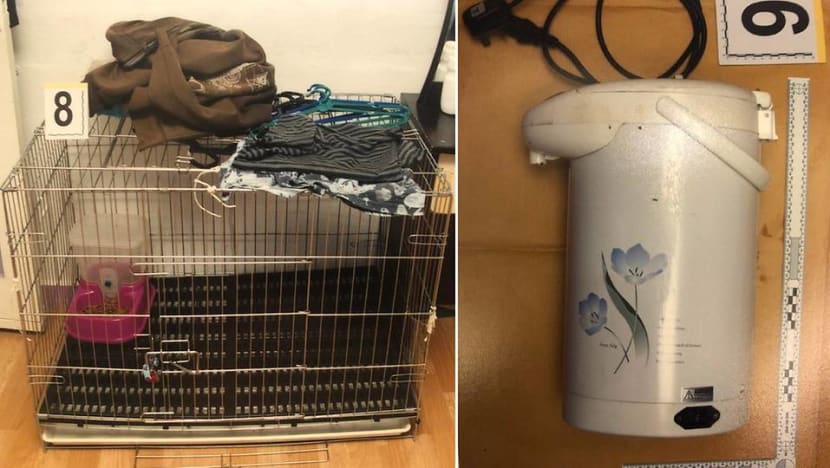Mother who scalded 5-year old convicted of murder on appeal; father gets life term

Photos from court documents of the cage allegedly used to confine the boy, and the hot water dispenser purportedly used in the offences.
SINGAPORE: The mother of a five-year-old boy who died of scald injuries has been convicted of murder on Tuesday (Jul 12) following an appeal by prosecutors.
The Court of Appeal also increased the sentence of the boy's father to life imprisonment. The couple, both 30, were convicted in 2020 of voluntarily causing grievous hurt by heated means.
Azlin Arujunah and her husband Ridzuan Mega Abdul Rahman were each originally sentenced to 27 years' jail. Ridzuan also received 24 strokes of the cane and Azlin received an additional 12 months' jail in lieu, as women cannot be caned.
With the appeal, Azlin's charge has been amended to murder under Section 300c of the Penal Code, which is punishable with death or life imprisonment.
The Court of Appeal adjourned to consider Azlin's sentence after the prosecution and defence have made further submissions.
High Court judge Valerie Thean had in 2020 acquitted the couple of murder with common intention after finding that the prosecution did not prove the element of common intention.
The boy was subject to abuse from about a year after returning to his parents from another family in May 2015. He was hit with tools like a broom or a hanger and pinched with pliers.
His parents began scalding him with hot water, leaving him limping in pain with blisters and peeling skin. He was eventually confined in a cage meant for the family cat.
From Oct 15 to Oct 22, 2016, the boy's parents scalded him with hot water on four occasions. This led to his death from severe scald injuries.
Delivering the judgment on behalf of a five-judge panel, Chief Justice Sundaresh Menon said that Azlin was solely responsible for the first and third scalding incidents, while she carried out the second and fourth scalding incidents jointly with Ridzuan.
During the first incident between Oct 15 to 17, 2016, Azlin grabbed her son by the ankle to prevent him from running away and poured hot water on his leg and hand several times.
In the second incident from Oct 17 to 19, 2016, Azlin threw several cups of hot water at the boy, who shouted at her: "Kau gila ke apa?", meaning "Are you crazy or what?"
Ridzuan heard this and threw more hot water at the boy.
The third incident on Oct 21, 2016 took place when Azlin became angry with the boy and chased him around the living room, throwing nine to 10 cups of hot water at him.
A day later in a fourth incident, Azlin told her husband to "deal with" the boy after he did not want to remove his shorts to take a bath.
Ridzuan hit the boy with a broom before throwing cups of hot water on him. The boy crouched down in the toilet as he was attacked and eventually fell forward and stopped moving.
He was taken to hospital after more than six hours as his parents were afraid of getting arrested. He went into shock during surgery and died of his injuries a day after he was admitted.
Chief Justice Menon said that an aggregation of Azlin's acts and intention across the four incidents was sufficient to make out the murder charge under Section 300c.
He said it was clear beyond reasonable doubt that Azlin intended to cause the scald injuries in all four incidents, and this satisfied an "expanded interpretation" of common intention.
This interpretation was permissible to deter group crimes and expand the criminal liability of those who commonly intend and participate in group crimes beyond the acts specifically committed by them, he said.
FATHER GETS LIFE IMPRISONMENT
In 2020, Justice Thean had found that life imprisonment was not justified for Ridzuan as his actions were not the worst case of offending under the charge of voluntarily causing grievous hurt with heated means.
But the Court of Appeal allowed Ridzuan's sentence to be amended to life imprisonment after finding that the trial judge failed to consider multiple accumulative aggravating factors.
These included the prolonged period of escalating abuse and the cruelty of the abuse, as extensive parts of the boy's body were scalded, including sensitive areas like his face and private parts.
Chief Justice Menon said the distress the boy experienced could only be assessed by considering all the scalding incidents, as they were not carried out on unblemished skin, but skin that was repeatedly and brutally injured.
Another aggravating factor was the fact that Azlin and Ridzuan carried out the acts against a defenceless young child in their own home, which allowed the abuse to take place over four months.
The judges also found that Ridzuan's case was devoid of material mitigating factors argued by the defence, such as his relatively young age of 24 at the time of the offences and purported remorse.
They said Ridzuan's defence of low adaptive functioning did not seem reasonable either, as a psychologist testified that his actual adaptive functioning was higher than what his test results suggested, due to the way he self-reported his abilities.
Chief Justice Menon said this made Ridzuan's offences one of the worst types of offending that justified life imprisonment. He also asked parties to submit on the man's caning sentence.
The appeal was decided by Chief Justice Menon and Justices Andrew Phang, Judith Prakash, Tay Yong Kwang and Steven Chong.














